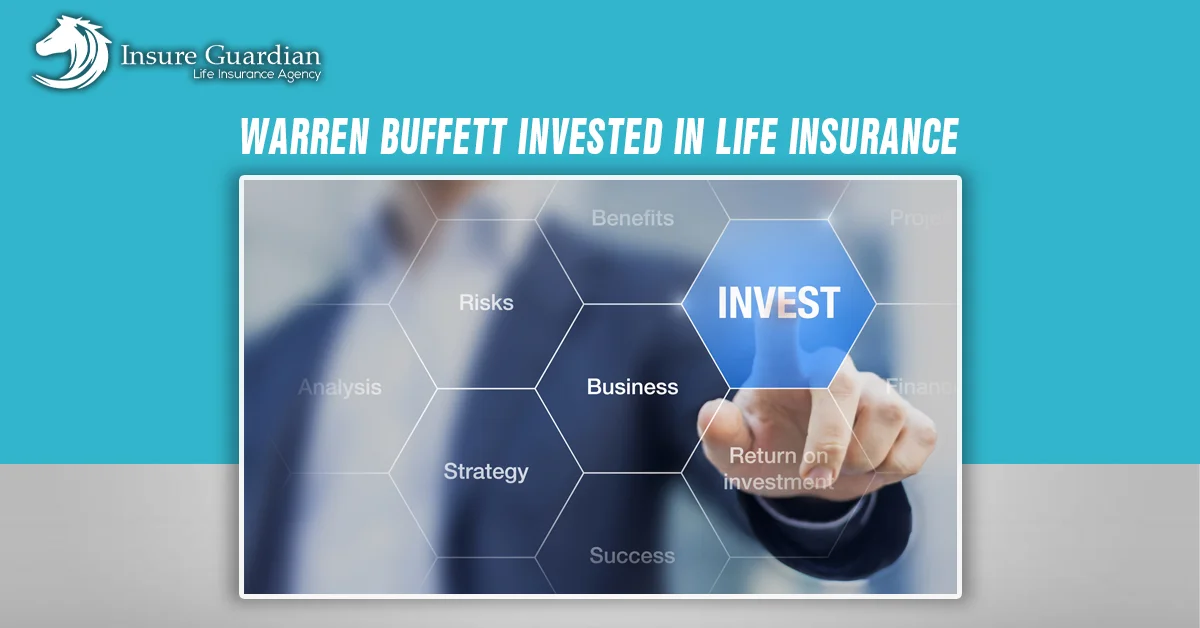Last Updated on: October 11th, 2024
Reviewed by Dylan
- Licensed Agent
- - @InsureGuardian
Key Takeaways
In this Blog you will learn
- Does Warren Buffett have life insurance?
- Warren Buffett’s approach to life insurance for estate planning and wealth preservation.
- How Buffett uses insurance companies like GEICO and others in his investing strategies.
- The importance of life insurance as part of a diversified investment portfolio.
- Warren Buffett’s views on investing in the insurance business, including his thoughts on insurance “float.”
- Insights on Warren Buffett’s general investment philosophy and strategies, including his avoidance of technology stocks during the dot-com bubble.
- The role of cyber insurance in today’s business environment, as highlighted by Buffett.
- Understanding the importance of insurance diversification for risk management.
- Frequently asked questions about Buffett’s involvement in various insurance companies, including GEICO and Progressive Insurance.
Have you ever wondered why Warren Buffett, one of the richest and most successful investors, is so involved in the insurance business? Do you want to know if Warren Buffett have life insurance? While most people see life insurance as a way to protect their families, Buffett sees it as a smart investment tool. Warren Buffett has a sizable personal insurance portfolio but uses life insurance for estate planning. Despite owning several insurance-related companies, including Geico and Genre, he rarely uses the insurance industry as a tool in his investing portfolio approach. Warren Buffett’s life insurance usage can shed light on his approach to wealth preservation and financial planning. So let’s explore his rationale for choosing life insurance and discover more about how Warren Buffett Invest in Life Insurance?
Does Buffett Warrant to Invest in Life Insurance
Warren Buffett has not publicly said whether he invests in life insurance, therefore it is only speculation at this point. He has undoubtedly invested in a variety of different financial instruments throughout the years, though.
In addition to stocks, bonds, commodities, derivatives, and other alternative investments, Buffett himself invests in life insurance. This is a crucial component of his financial strategy. Therefore, even though Buffett may not invest directly in life insurance, his investment philosophy and methods are still relevant.
A complex financial instrument like life insurance shouldn’t be taken for granted. Buffett has always advocated diversifying investments, so buying life insurance is a wise approach to diversifying your holdings. This is while lowering your risk and keeping your payments stable.
Buffett is likely to advise clients to diversify their portfolios by investing in a range of different assets, such as stocks, bonds, commodities, and other alternative investments, in addition to life insurance. Investors should carefully weigh the pros and cons of each of these possibilities before making an investment. This is because each has its own unique set of advantages and disadvantages.
Buffett discusses keeping costs as low as possible and diversifying his investments. When purchasing life insurance, this tactic can maximize earnings while minimizing risk. Investors can obtain the most value for their money while still safeguarding their families in the event of death. This is done by shopping around for the right rates and plans.
Warren Buffet has a lengthy history of success, so any investment decision he may make should be given careful thought. Value investors may learn a lot from his views and techniques, regardless of whether it is known that he has decided to invest in life insurance or not. Therefore, whether or not Warren Buffett has purchased life insurance, investors must learn about the ins and outs of this product. This is before making a decision.
Warren buffett quotes on life insurance
In May 2024, Warren Buffett shared his valuable advises on insurance industry during the Berkshire Hathaway annual general meeting. As maturing and seasoned in the art of business as Warren Buffett is, his perspectives on the events are simple and educational.
Warren Buffett pointed out the insurance business as very attractive in the business venture. “It’s so much fun because you get the money at the start, you know, and then you find out whether you’ve done something stupid later on,” he quipped.
How Much Does Life Isurance Cost?
Insurance firms receive their cash immediately in terms of premiums whereas the costs (claims) come in at a later date. This make it an appealing way to do business.
“Insurance always looks easier than it is.” This simplicity arises from the basic premise where “somebody hands you money, and you hand them a little piece of paper.” Still, the real challenge lies in accurately assessing risks and pricing policies.
Buffett’s Investing Strategy
The investment strategy of Buffett tends to follow a strategy of buying stock in what he considers to be sound businesses that are trading below their true value. Often when he buys the securities, he does it with the mind set that he is going to keep them forever. These included Coca-Cola group, American Express, and Costco which still form part of Berkshire Hathaway’s investment to date. Often he bought the companies outright but allowed the management to operate them as they saw fit.
Some of the firms that can be categorized under this type include See’s Candies, Fruit of the Loom, Dairy Queen, Pampered Chef, Heinz, and GEICO. The mystique that Buffett continued to maintain was that the technology stocks became popular. Facing the spectacular rise in technology stocks in the late 1990s, Buffett refused to become involved – he is a serious technophobe. Standing by his word and not buying into companies which didn’t fit the requirements of his investment philosophy, Buffett became a pariah to the Wall Street gurus and was dismissed by most as a has-been. It is worth mentioning that many of those experts lost their money and went bankrupt during the collapse of the dotcom bubble known as the tech wreck. Buffett’s profits doubled.
Warren Buffett Invest in Life Insurance: The Insurance Secret?
One thing Buffett cottoned on to early on with insurance is the “float” which is the money insurers keep from premium payments before having to pay out claims.
Why is the Warren Buffett insurance float so valuable?
Because Buffett gets to invest that “float” in higher yielding assets, whether wholly-owned companies Berkshire acquires or stocks.
Warren buffett cyber insurance
Warren Buffett cyber insurance plays a crucial role in mitigating the financial impact of cyberattacks. It provides businesses with the necessary coverage to recover from data breaches, ransomware attacks, and other cyber incidents. A comprehensive cyber insurance policy can cover various costs, including legal fees, customer notification expenses, and the cost of restoring compromised data. Additionally, cyber insurance can help businesses demonstrate compliance with regulatory requirements and build trust with their customers by showing that they are taking proactive steps to protect sensitive information.
Warren Buffett, chairman and CEO, also highlighted the inherent risks of cyber insurance, comparing them to the unpredictable nature of earthquakes.
“When you write insurance, you have to think about how much you can lose,” Buffett said in a report, pointing out the potential for significant risk aggregation that could surpass typical natural disasters.
What Berkshire Hathaway Travel Protection Is Known For?
Berkshire Hathaway is a renowned investment firm that’s regularly associated with its largest shareholder, Warren Buffet. The company also oversees a range of other business ventures, including a Wisconsin-based travel insurance company that shares a name with the firm.
Warren Buffett flight insurance is known for offering a diverse range of plans that can make sense for different types of trips, including single trips anywhere in the world, cruises, adventure travel and road trips. The company also offers a unique travel insurance plan called LuxuryCare, which offers elevated coverage amounts for everything from trip cancellations and interruptions to emergency medical expenses, emergency medical evacuation, and lost or delayed baggage.
Berkshire Hathaway cruise insurance, which the company refers to as WaveCare, is another standout offering from the provider. This cruise-specific coverage offers typical protections you would expect with a travel insurance plan, plus cruise-related benefits for cruise ship disablement, cruise diversions and missed connections.
Conclusion
As we wrap up Warren Buffett Invest in Life Insurance. It’s all about Warren Buffett Investment strategies and how he did his investments. In conclusion, even if purchasing life insurance is a personal choice, it is a possibility that should be considered. It is a source of income that typically provides stability and long-term financial security. Warren Buffet demonstrates how purchasing life insurance can result in long-term financial gain.
FAQs
1- Has Warren Buffett ever purchased whole life insurance?
The answers provide mixed perspectives on whether Warren Buffett has purchased whole life insurance, with some speculating he has and others doubting it. They also discuss the potential benefits and drawbacks of whole life insurance for wealthy individuals and corporations.
“It is well known that Buffett has been purchasing multiple policies each year for the past 3 decades.
2- Does Warren Buffett own Progressive Insurance?
No, Warren Buffett does not own Progressive Insurance.
Progressive is an independent company, publicly traded on the New York Stock Exchange under the ticker symbol “PGR.” Warren Buffett’s company, Berkshire Hathaway, owns a different insurance company, GEICO, which is one of Progressive’s main competitors in the auto insurance market. Buffett is well-known for his significant investments in the insurance industry, but his portfolio does not include ownership of Progressive Insurance.
References:
- https://www.fundcalibre.com/warren-buffet-is-investing-in-insurance-should-you-too
- https://finance.yahoo.com/news/warren-buffett-says-insurance-business-140020919.html?guccounter=1&guce_referrer=aHR0cHM6Ly93d3cuZ29vZ2xlLmNvbS8&guce_referrer_sig=AQAAAECMZyYqeVMTSwCOtgAEwTU-ibnWPjH3F6sVFjCAKQarqx3HVEiPY-GM06-pA8CXaaaUF3kvcqt-RKOQqffS_LLf5guLVUctztCqKwQ_ES1rSIFtRnLNBG0ZJDWgfNjQEYs93TmyU5rvF3VC2ZRUowsQ-gkHYgcCf1kN3lWIzRmy
- https://www.cnbc.com/2024/07/24/crowdstrike-biggest-test-yet-for-cyber-insurance-buffett-warned-about.html

Expert Life Insurance Agent and health insurance agent
Dylan is your go-to guy for life and health insurance at InsureGuardian. He’s helped over 2,500 clients just like you figure out the best insurance plans for their needs. Before joining us, Dylan was sharing his expertise on TV with Global News and making a difference with various charities focused on health. He’s not just about selling insurance; he’s passionate about making sure you’re covered for whatever life throws your way.






